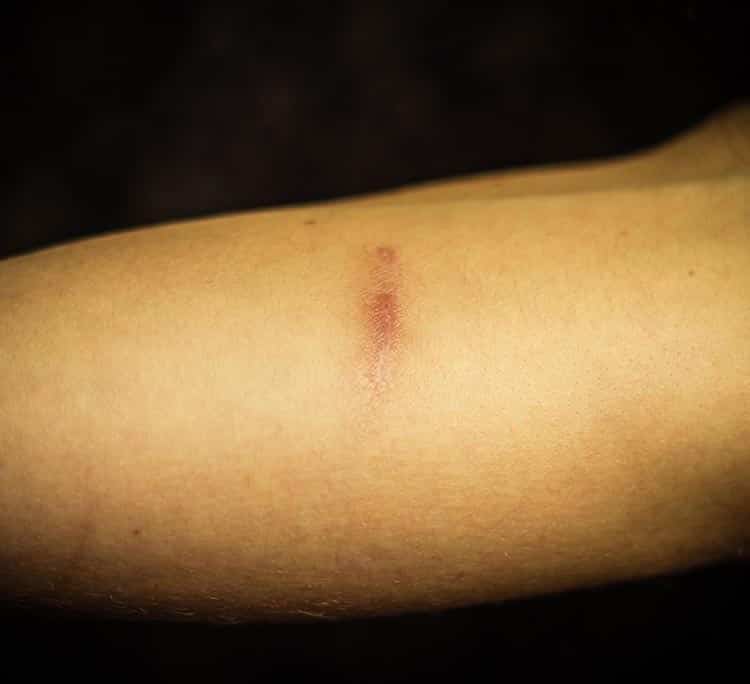Skin picking, also known as dermatillomania or excoriation disorder, is a psychological condition characterized by repetitive and compulsive picking at one’s own skin. The exact cause of skin picking disorder is not fully understood, but it is believed to involve a combination of genetic, neurological, psychological, and environmental factors. It is often categorized as an obsessive-compulsive related disorder or a body-focused repetitive behavior. People with skin picking disorder may focus on various parts of their body, including the face, arms, legs, or other areas where imperfections, blemishes, or perceived irregularities are present.
Skin picking can lead to various negative outcomes, including:
- Skin damage: Constant picking can cause wounds, scars, infections, and other forms of skin damage, which may be difficult to heal and can worsen over time.
- Emotional distress: Individuals who engage in skin picking often experience feelings of shame, guilt, embarrassment, and anxiety due to their inability to control the behavior.
- Social isolation: The visible consequences of skin picking can lead to self-consciousness, making individuals avoid social situations or feel uncomfortable in public settings.
- Time consumption: Engaging in skin picking can be time-consuming and interfere with daily activities, work, and relationships.
- Relationship strain: The condition may strain relationships with friends, family, and partners who might not understand the compulsive nature of the behavior.

The exact cause of skin picking disorder is not fully understood, but it is believed to involve a combination of genetic, neurological, psychological, and environmental factors. It is often categorized as an obsessive-compulsive related disorder or a body-focused repetitive behavior. Treatment for skin picking disorder may involve a combination of therapies, including cognitive-behavioral therapy (CBT), medications, support groups, and developing healthy coping strategies to manage the urge to pick.
If you or someone you know is struggling with skin picking or any related issues, it’s important to seek help from a mental health professional who can provide an accurate diagnosis and develop an appropriate treatment plan.
Treatment for skin picking disorder may involve a combination of therapies, including cognitive-behavioral therapy (CBT), medications, support groups, and developing healthy coping strategies to manage the urge to pick.This behavior often goes beyond normal grooming or personal hygiene and can result in significant physical and emotional distress. Stopping skin picking, also known as dermatillomania or excoriation disorder, can be challenging, but there are several techniques you can try to help manage and eventually overcome this behavior. Here are some techniques that may be helpful:
Awareness and Mindfulness: Pay attention to when and why you engage in skin picking. Keep a journal to track triggers, emotions, and situations that lead to the behavior. Practice mindfulness techniques to stay present in the moment and observe your urges without immediately acting on them.
Replacement Behaviors: Identify alternative behaviors that you can engage in instead of picking your skin. For example, you could use a stress ball, fidget toy, or textured object to keep your hands busy.
Keep Your Hands Occupied: Engage in activities that keep your hands occupied and away from your skin, such as knitting, drawing, painting, or playing a musical instrument.
Physical Barriers: Use physical barriers to make it more difficult to pick your skin. For example, you could wear gloves, bandages, or even tape your fingertips when you’re at home.
Visual Reminders: Place reminders in areas where you usually pick your skin. These reminders can help you become more conscious of the behavior and encourage you to stop.
Practice Self-Care: Pay attention to your skin care routine and make sure you’re taking good care of your skin. When you feel the urge to pick, remind yourself that you’re trying to take care of your skin’s health.
Delay and Distraction: When you feel the urge to pick, try to delay the behavior for a few minutes. Engage in a different activity that requires focus, such as reading, watching a short video, or doing a puzzle.
Relaxation Techniques: Practice relaxation techniques, such as deep breathing, meditation, or progressive muscle relaxation. These techniques can help reduce anxiety and stress, which are often triggers for skin picking.
Cognitive-Behavioral Therapy (CBT): Consider working with a therapist who specializes in CBT or cognitive-behavioral techniques. CBT can help you identify the thoughts, feelings, and beliefs associated with your skin picking and develop healthier coping strategies.
Support System: Share your goal of stopping skin picking with friends, family, or support groups. Having a support system can provide encouragement and accountability.
Reward System: Set up a reward system for yourself. When you successfully avoid picking your skin for a certain period, reward yourself with something you enjoy.
Professional Help: If your skin picking is causing significant distress or interfering with your daily life, consider seeking help from a mental health professional. They can provide guidance, support, and therapy tailored to your specific needs.
If you or someone you know is struggling with skin picking or any related issues, it’s important to seek help from a mental health professional who can provide an accurate diagnosis and develop an appropriate treatment plan.
Remember that overcoming skin picking takes time and effort. Be patient with yourself and celebrate your small victories along the way. If you find that one technique isn’t working for you, don’t hesitate to try a different approach or combination of strategies.

Dr. Yaro Garcia
Hello, I am Dr. Garcia, please call me Yaro. My degrees are in clinical psychology and I am a licensed mental health counselor. My approach is caring, warm, safe, non-judgmental, and straight forward. It is a difficult decision to seek therapy, I take time to build a trusting therapeutic relationship with you…
















